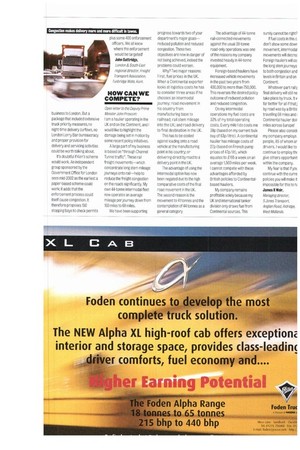HOW CAN WE COMPETE?
Page 23

If you've noticed an error in this article please click here to report it so we can fix it.
Open ietter to the Deputy Prime Minister John Prescott: lam a haulier operating in the UK and on the Continent, and I would like to highlight the damage being set in motion by some recent policy initiatives.
A large part of my business is based on "through Channel Tunnel traffic". These rail freight movements—which concentrate long stem mileage journeys onto rail—help to reduce the freight congestion on the roads significantly. My own 44-tonne intermodal fleet now operates an average mileage per journey down from 160 miles to 68 miles.
We have been supporting progress towards two of your department's major goals— reduced pollution and reduced congestion. These two objectives are now in danger of not being achieved, indeed the problems could worsen.
Why? Two major reasons: First, fuel prices in the UK. When a Continental exporter looks at logistics costs he has to consider three areas if he chooses an intermodal journey: road movement in his country from manufacturing base to railhead; rail stem mileage into the UK; and road delivery to final destination in the UK.
This has to be costed against loading onto a road vehicle at the manufacturing point in his country; or delivering direct by road to a delivery point in the UK.
The advantage of using the intermodal option has now been negated due to the high comparative costs of the final road movement in the UK. The second reason is the movement to 41tonnes and the contemplation of 44 tonnes as a general category The advantage of 44-tonne rail-connected movements against the usual 38-tonne road-only operations was one of the reasons my company invested heavily in 44-tonne equipment.
Foreign-based hauliers have increased vehicle movements in the past two years from 400,000 to more than 750,000. This reverses the desired policy outcome of reduced pollution and reduced congestion.
On my intermodal operations my fuel costs are 33% of my total operating costs. Every mile I do costs me 38p (based on my current bulk buy of 63p/litre). A continental haulier has mileage costs of 27p (based on French pump prices of 47p/lit), which equates to 2165 a week on an average 1,500 miles per week. I cannot compete with these advantages afforded by British policies to Continentalbased hauliers.
My company remains profitable solely because my UK and international tanker division only draws fuel from Continental sources. This surely cannot be right?
If fuel costs in this c don't show some down movement, intermodal movements will decree Foreign hauliers will co the long stem journeys to both congestion and levels in Britain and on Continent.
Whatever part rail final delivery will still ne take place by truck. It v far better for all if that] by road was by a Britisl travelling 68 miles and i Continental haulier doir miles across Europe!
Please also considi my company employs people, 85 of whom ar drivers. I would like to continue to employ thc give others opportunit within the company.
My fear is that if you continue with the curre policies you will make it impossible for this to N James II Welr, Managing director, S Jones Transport, Anglian Road, Aldridge, West Midlands.




































































































